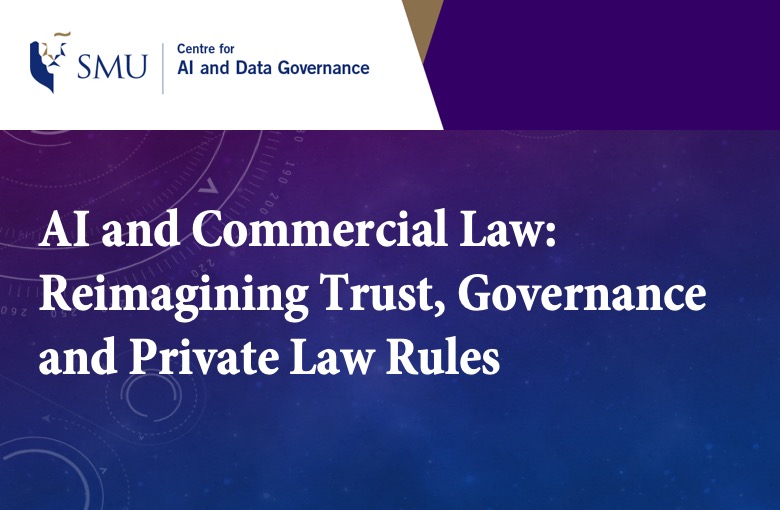Session 3: AI and Data Protection: Conceptions of Property and Trust
Session Chair
|

Wang Yanjun
Group Chief Corporate Officer, General Counsel and Company Secretary
SEA Group
|
|
Yanjun Wang is Sea’s Group Chief Corporate Officer, Group General Counsel and Company Secretary. Yanjun oversees the group corporate functions of communications, corporate development and strategy, investor relations, legal, and public policy. Yanjun has served as Sea’s Group Chief Corporate Officer since May 2019, Company Secretary since November 2017 and Group General Counsel since March 2014. She established and leads the Company’s in-house legal function across all businesses and offices. Prior to joining Sea, Yanjun was an attorney at Skadden, Arps, Slate, Meagher & Flom LLP in New York and Kirkland & Ellis in Hong Kong. She is qualified to practice law in the State of New York. She holds a J.D. degree from Harvard Law School and a B.A. degree in Economics from Harvard University. |
Speakers
“Property in Personal Data”
Synopsis
Personal data is often described in popular discourse as “property”. For example, a wrongful disclosure or an unauthorised use of personal data is likened to “theft”, suggesting that the victim has been deprived of a “thing” she owned. As the digital economy expands, this reification of information appears now to be even more apposite as technological advances enable not only the efficient collection but also commodification of consumer information at a scale hitherto unseen. So used in common parlance, the term “property” connotes the personal and monetary value of, and the dominion that an owner expects to assert over, the asset. From a legal perspective, however, it is contestable whether personal data should be so categorised not least because information is inherently non-rivalrous (in that it is not consumed by use) and often non-excludable (if it is too costly to prevent access by others). To conceive of personal data as property would thus require a significant departure from conventional view of property as a rivalrous and excludable resource. To be sure, the question whether personal data may be “propertised” is by no means novel in that the debate has been alive ever since the rise of information as a valuable resource. However, the issue is all the more pressing now that data is fast gaining significance as a class of prized assets. The purpose of this article is to unpack the competing senses in which personal data may be conceived as “property” and the possible merits of such conception in data governance. Specifically, it will consider whether the Singapore Personal Data Protection Act (Act 26 of 2012) facilitates the reification of personal data as “property” and whether such development could inform or bridge regulatory gaps.
Speaker
|

Lee Pey Woan
Professor and Associate Dean (UG Curriculum & Teaching)
SMU School of Law
|
|
Lee Pey Woan is Professor of Law, School of Law, Singapore Management University. She graduated with an LL.B (First Class Honours) from King’s College, University of London and subsequently obtained the BCL from Oxford University. Pey Woan is an Advocate and Solicitor of the Singapore Supreme Court and was also called to the external Bar in England and Wales (Middle Temple). Prior to joining SMU in 2000, she was the Legal Manager of Keppel Corporation Limited. She joined Singapore Management University in 2000, and was appointed as Associate Professor of Law in 2008. Pey Woan is currently Associate Dean (Teaching and Curriculum) of the School of Law as well as Academic Director for Faculty Affairs. In the latter capacity, she is closely involved in the drafting and design of the University’s governance policies. Pey Woan teaches Corporate Law but her research interests encompass company, private and commercial law. She has published widely in local as well as leading international journals including the Modern Law Review, Oxford Journal of Legal Studies, Law Quarterly Review, Lloyd’s Maritime and Commercial Law Quarterly as well as Journal of Business Law. She has also co-authored text books on Contract Law, Tort Law and Company Law. Her works have been cited by the Singapore Court of Appeal, the Singapore High Court and the Canadian Supreme Court. Apart from academic activities, Pey Woan also serves the legal profession by periodically speaking at legal conferences. In 2016, she was appointed amicus curiae to the Singapore Court of Appeal in PH Hydraulics & Engineering Pte Ltd v Airtrust (Hong Kong) Ltd [2017] SGCA 26; [2017] 2 SLR 129.
|
“Data Trusts for Lawful AI Data Sharing”
Synopsis
Recent advances in AI have primarily been based on machine learning, which requires substantial datasets for analysis. It is those datasets which make successful development of AI possible. And the more comprehensive the dataset, the more likely it is that an AI will make good decisions, and avoid bad ones. Thus data sharing is a foundational activity for AI.
But there are two main obstacles to data sharing. Data trusts are, in most cases, private law mechanisms whose purpose is to overcome those obstacles and thus enable data sharing.
The first obstacle is trust, in the psychological but possibly also the legal sense. The paper will examine how data trusts can achieve this trust, primarily through their legal structures and in particular their legally entrenched governance mechanisms. The second is the existence of legal and moral/emotional interests in data, primarily in the form of proprietary rights, confidentiality and privacy/data protection. Trust can deal with some elements of those interests, but other aspects of those interests might require law reform if data trusts are to work effectively. The nature of these law reforms will be analysed, using UK and Singaporean law as examples.
We will see that the obstacles are not insurmountable, and that data trusts have the potential to become foundational legal structures for AI development.
Speaker
|

Chris Reed
Professor
Centre for Commercial Law Centre (CCLS), Queen Mary University of London
|
|
Chris Reed is Professor of Electronic Commerce Law at the Centre for Commercial Law Studies, Queen Mary University of London, where he was formerly Director of the Centre and subsequently Academic Dean of the Faculty of Law & Social Science. He consults to companies and law firms, having previously been of counsel to the City of London law firms Lawrence Graham, Tite & Lewis and Stephenson Harwood.
Chris has worked exclusively in the computing and technology law field since 1987, and teaches University of London LLM students from all over the world. He has published widely on many aspects of computer law; his latest books are Rethinking the Jurisprudence of Cyberspace (with Andrew Murray, Edward Elgar 2018) and Making Laws for Cyberspace (OUP 2012), Research with which he was involved led to the EU directives on electronic signatures and on electronic commerce. The Leverhulme Foundation awarded him a Major Research Fellowship for 2009-2011 (see Making Laws for Cyberspace for findings).
From 1997 to 2000 Chris was Joint Chairman of the Society for Computers and Law, of which he is an inaugural Honorary Fellow, and in 1997-8 he acted as Specialist Adviser to the House of Lords Select Committee on Science and Technology. Chris has acted as an Expert for the European Commission, represented the UK Government at the Hague Conference on Private International Law and has been an invited speaker at OECD and G8 international conferences.
|
“Blockchain in Land Administration: Potential Implementations in Two Asian Jurisdictions Compared”
Synopsis
The security of land rights is closely linked to the reduction of poverty and the stimulation of economic growth of a country. Although the blockchain technology is often touted as an effective tool towards achieving this goal, precisely what this entails, especially its potential disruption of existing laws, is often unclear. In many mature jurisdictions which adopt a system of title by registration, the land-register is usually determinative of who owns what, subject to several exceptions that protect certain innocent parties whose interests are off-register. Given that the core feature of a blockchain is its irreversibility, the challenge is to temper the technology to fit the nuances of the existing law. In contrast, the use of the blockchain technology as a true foundation of a registration system, by keeping its core feature fully intact, is perhaps more attractive in a jurisdiction where the existing land administration is met with public distrust. Rather than developing an ideal system, the shift to an entirely trustless and irreversible land-register addresses the more pressing need to restore public confidence, which would in turn lead to rejuvenation of the land market and stimulate economic growth. If one accepts that this is a worthy goal, even if only as a short-term measure, it is important to consider how the law should be crafted to give full effect to the core characteristic of the blockchain technology while mitigating the harshness that flows from its inherent rigidity. With these differing goals in mind, this paper posits that the blockchain technology is likely to be implemented very differently in Singapore, which has a mature land administration, and in India where the integrity of its land administration is often called into question.
Speaker
|

Alvin See
Associate Professor and Associate Dean (Student, Staff and Alumni Affairs)
SMU School of Law
|
|
Alvin See is an Associate Professor of Law (Education) and Associate Dean (Student, Staff & Alumni Affairs) at the School of Law, Singapore Management University (SMU). He teaches the Law of Property, the Law of Equity and Trusts and Business Law. He researches mainly on private law, particularly property, trust, unjust enrichment and remedies, and dabbles in animal law. His published works, which appear in leading journals, have been cited by the highest appellate courts in Singapore and Malaysia as well as important treatises on private law. For his excellence in teaching and research, he was awarded, at the university level, the Excellent Teacher Award and the Lee Kong Chian Fellowship.
|
Commentators
|

Koh Chia-Ling
Managing Director
Osborne Clark (Queen Street)
|
|
Chia-Ling is a Director of Singapore Law Practice, OC Queen Street LLC.
He supports digital innovation, investments and critical infrastructural transformation. Examples of digital projects:
- commercialisation of artificial intelligence neural network technology
- unified communications, which may include multi channel support for customer contact such as email, chat, voice, mobile and social media,
- core banking and trading systems
- satellite-based payment systems
- satellite-based transportation tracking systems
- collaboration between two gaming Asian giants transforming game from the web to mobile platform
- digital mobile payment systems
- high-profile IP/IT disputes involving digital innovation
Chia-Ling advises organisations on both contentious and non-contentious cyber security issues, data protection, data-mapping, data-governance, intellectual property management, validity and infringement, due-diligence, telecommunications and media regulations, competition, FinTech and payments financial regulations.
- Chia-Ling’s core areas of expertise lie in technology and dispute resolution. According to peers, he is ‘known for his strength as a technology practitioner. Chambers Asia Pacific 2016
- Praised by clients for having a “good balance of technology and legal skills”and for being a “good technology lawyer” in both IP and TMT Legal500 2016
- Chia-Ling “gains recognition for his ‘understanding of the technical aspect of disputes’. Corporation clients frequently rely on his expertise in cross border TMT litigation and data policy matters.” Chambers Asia Pacific 2015
- Chia-Ling “is prized for his commerciality: He is ‘able to understand the business context and provides advice that is to the point.” Chambers Asia Pacific 2014
- Chia-Ling has been consistently named as an “IP Star” by Managing IP.
|
|

Benjamin Wong
Sheridan Fellow
National University of Singapore
|
|
Benjamin is a Sheridan Fellow with the NUS Faculty of Law, and an Advocate & Solicitor in Singapore. His research interests include data protection law. Prior to his current appointment, Benjamin was a Research Assistant with the EW Barker Centre for Law & Business, where he conducted research on intellectual property law. During his stint in Drew & Napier LLC, he worked in the fields of competition law and data protection law, among other areas of regulatory practice. |









